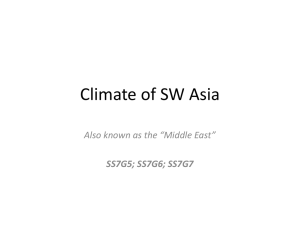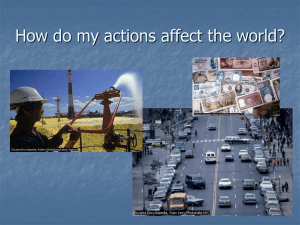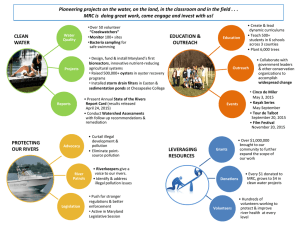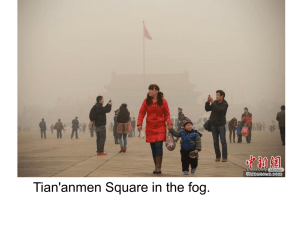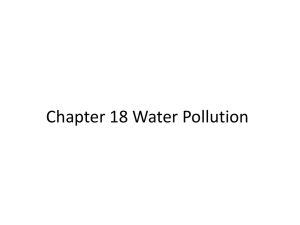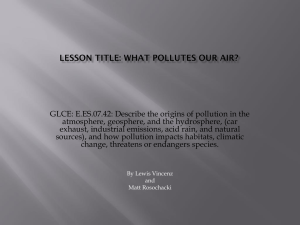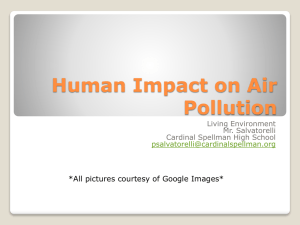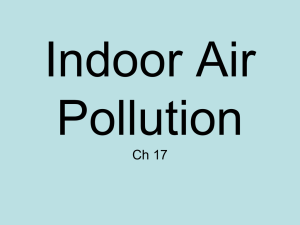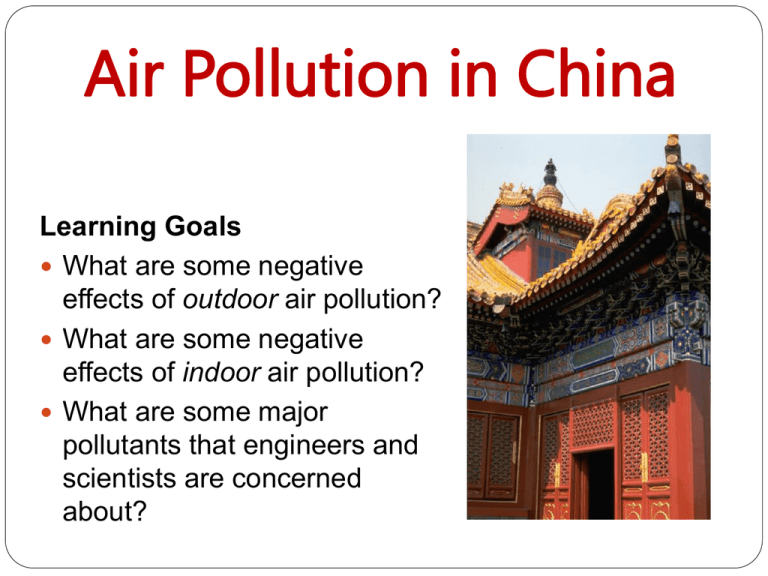
Air Pollution in China
Learning Goals
What are some negative
effects of outdoor air pollution?
What are some negative
effects of indoor air pollution?
What are some major
pollutants that engineers and
scientists are concerned
about?
Where in the world is China?
How many people live in China?
…about 1.3 billion people!
China is a fascinating country
with a very long history
China’s economy is growing very quickly
One consequence of growth is increased
pollution
Which two countries in the world
use the most energy?
China uses the most energy overall
The U.S. uses the most energy per person
We can work together to use
clean energy and take good
care of the Earth
Pollution in Rural China
Many people live in the countryside, in rural areas
Some of these people are very poor
Some of them live on $1, $2, or less than $5 per day
This is a picture of a village
in southwestern China
© Abigail Watrous
Solid Fuels
Many people who live in the
countryside in China use solid fuels
to cook meals and heat their homes
Solid fuels include coal, corn stalks,
wood, and other types of biomass
Burning these fuels in a stove that is
not very good, or doesn’t have a
chimney, releases a lot of pollution
into the air, which is damaging to
people’s health.
© Abigail Watrous
This is a small coal stove,
called a “cookstove”
Health Effects
of Indoor Air Pollution
Nearly 3 billion people in the world use solid
fuels for cooking
One of the most dangerous emissions from
these fuels is PM2.5 (particulate matter 2.5)
PM2.5 are very small particles that get deep
into your lungs when you breathe
These particles, along with other emissions,
can cause serious health conditions
Scientists and engineers are investigating to find
better ways for people without much money to
cook their meals and heat their homes
Health Effects
of Indoor Air Pollution
Negative health effects of
indoor air pollution include:
acute respiratory infections
chronic obstructive pulmonary
disease (COPD)
lung cancer
Possible other health effects include:
cataracts
low birth weight
Urban Pollution
China has many VERY big cities
Beijing, the capital city, has more than 22 million people
That’s more than twice the population of New York City
(about 8 million)
Many people are moving
from the countryside into the
cities, where much new
construction is happening
As people get more money,
they are buying cars —
at one point, Beijing was
getting 2,000 new cars
every day!
© Abigail Watrous
Outdoor Air Pollution
All of the people in the cities need to use energy, too!
Scientists and engineers are very concerned about the
rising levels of outdoor air pollution
Two pollutants they are
especially worried about are
PM2.5 and CO2 (carbon dioxide)
CO2 at low levels is good, but
too much may really hurt the
Earth
Global PM2.5 Levels
2001-06 average from NASA
Source: http://www.nasa.gov/topics/earth/features/health-sapping.html
Increase of carbon dioxide over
time as population increases
What are three things you notice in looking at this graph?
Time period: ~1960 - 2007
Source: http://www.google.com/publicdata/directory
Outdoor Air Pollution
Some negative effects of
outdoor air pollution include:
acid rain
ozone depletion
global warming
climate change
What can people in the city
do to save energy?
Turn off lights when they
leave a room
Use energy-saving light
bulbs
Walk, take the subway,
or ride bicycles to work
Don’t buy a personal car
© Abigail Watrous
Factory owners can install special machines to help
reduce air pollution emissions from their factories
Some Chinese words to learn:
Ni hao 你好
Hello
Ni hao ma? 你好吗?
How are you?
Wo hen hao 我很好
I’m very good
Zai jian 再见
Goodbye
Da jia hao 大家好
Hello everyone
Lao shi hao 老师好
Hello teacher!
Learning Goals Answers
Negative effects of outdoor air pollution:
acid rain
ozone depletion
global warming
climate change
Negative effects of indoor air pollution:
chronic obstructive pulmonary disease
lung cancer
acute respiratory infection
possibly: cataracts and low birth weight
Major pollutants engineers and scientists are concerned about:
CO2 (carbon dioxide)
PM2.5 (particulate matter 2.5)
the end
Note on image sources
Image sources are usually noted on individual slide pages.
If not noted, source is Microsoft Clipart: 2004 Microsoft Corporation, One
Microsoft Way, Redmond, WA 98052-6399 USA. All rights reserved.



